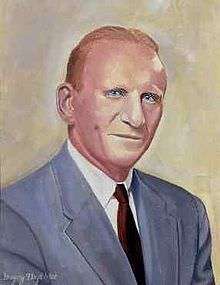Mr. Fertig is an economic columnist. This article appears by permission of Columbia Features, Inc.
A trip abroad for discussions with economists from various parts of the world (as well as some incidental sight-seeing and research) has a therapeutic value. It acts as a kind of brainwash — not, of course, the kind that Governor Romney talks about. Distance from the U.S. gives one perspective on events and trends, which is sorely needed in this hectic world.
We all know that the U.S. has a very advanced technology and a vigorous enterprise system, but only by talking to foreign observers can we grasp the great respect, amounting almost to awe, with which they regard the sheer dynamism of the American economy. The fact of American dynamism is more forcibly impressed as one travels about Europe and observes how business is done. Although American methods are often imitated, the tremendous drive which characterizes American operations is largely lacking.
This contrast is noted by European economists. They express tremendous confidence in the economic future of the U.S. Despite sensational stories in the foreign press about race riots in our major cities, shrewd Europeans understand that our political structure is quite solid. Anyway, they ask, if one is not to trust investments in the U.S., where in the world is it possible to commit capital funds with safety?
Equilibrium Is Unstable
The dynamism of the American economy was brought to mind by a brilliant theoretical paper delivered at the Mont Pelerin Society conference at Vichy, France, by Professor Israel Kirzner of New York University. The point he made was that economic analysis, until recently, always stressed the importance of “equilibrium” — the balance of economic forces. But the idea accented by the eminent Dr. Ludwig von Mises and by Dr. Friedrich Hayek (who represent the “Austrian” school of thought) gives pre-eminence to the millions of individual decisions which create “disequilibrium,” or change.
They emphasize change and movement in the economy as the important ingredient. “Equilibrium” is, to be sure, a theoretical objective, but this delicate balance is shattered in a dynamic economy the instant it is reached. The Mises theory, as Kirzner explains it, points to the fact that individuals are always “seeking out the best course of action, venturing, exploring, innovating, searching. They are constantly testing the nature of the constraints which circumscribe them.” It is this questing and dynamism which changes the relationship of economic factors every day and every hour. Old methods and old businesses often die in the process and new ones are created. The late Professor Joseph Schumpeter of Harvard aptly called this process “creative destruction.”
Restraints That Destroy
Governments are always seeking to create some kind of equilibrium by imposing restraints on people’s actions — restrictions which they believe will give the desired result. They order wage-price controls, investment controls, exchange controls, etc., etc., in an attempt to achieve their objective. But these government controls are like the weight of a dead hand. Individuals always try to find ways of circumventing government regulations which place the free market in a strait jacket. The free market permits human inventiveness and energy to express itself, and any attempt to control these creative factors is self-defeating and harmful.
One way in which governments seek to achieve their objective is by monetary manipulation. In the main, this means inflation. Under certain depressed conditions and for a time, such a policy seems to be successful. As the inflation continues, a new equilibrium is reached at some higher level of industrial activity. Then the forces of change undermine the new balance. When necessary adjustments begin to take place, governments try to preserve the old balance, and this leads to a new inflation. Thus, the inflationary process becomes perpetual and so does the depreciation of paper money.
In this month [October, 1967] the U. S. economy is trying to adjust — as it has been trying for many months — to a new set of conditions. It is adjusting to one of the strongest infusions of money and credit into the economic bloodstream that has ever occurred in so short a time. The immediate consequence of this inflation is becoming evident in expanded activity and higher prices. The long-term consequence is another matter. It may not be so pleasant.
“You are a very powerful, dynamic nation,” said a distinguished European economist to me during the conference at Vichy. “But you do foolish things, especially in monetary and fiscal policies.” Then he paused, and thoughtfully said, “But you probably can continue such actions quite a time to come. They may not be fatal now. But it is tragic to see a nation as rich and powerful as yours sapping its strength and undermining its foundations. In the long run, such policies have always been disastrous.”
***
Civil Liberty
I would choose to call civil liberty that power over their own actions which the members of the state reserve to themselves, and which their officers must not infringe.
JOSEPH PRIESTLEY

